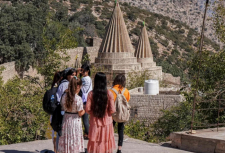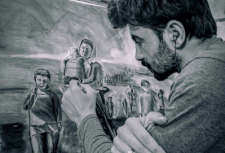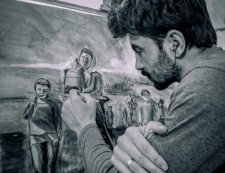Germany is not fair to the Yazidis

"At present, the Highest Administrative Court of Munster in Germany does not see the persecution of Yazidis by ISIL in Iraq" - the statement of the Central Yazidi Council of Germany.
In May 2021, the Higher Administrative Court of Munster announced a decision that worsened the situation of Yazidis in Germany, increasing the desperation of Yazidi refugees seeking asylum in Germany in contrast to radical Islamists who freely receive a residence permit.
The Munster High Administrative Court no longer classifies the Yazidis in Iraq as a group targeted by ISIS. As a result, the Yazidis are deprived of their basic right to protection in Germany. In their defense, the judges say :" Although the Islamic State remains an active terrorist group, not all Yazidis in Sinjar are currently at risk of persecution. On the other hand, the reason is this: in Kurdistan in Iraq, the situation does not violate human rights, and people can find refuge there, " the statement said.
But it does not mention that in Iraq, in Kurdistan, the Yazidis have been in inhumane conditions for seven years, living in tents at a temperature of +50 in summer, and -40 degrees in winter, where there is no infrastructure, sewage, total unemployment, no schools, hospitals, all humanitarian aid is stolen by local officials before reaching the camps.
The repression and marginalization of Yazidis in the Iraqi, Kurdish Muslim community is still de facto practiced by the vast majority. The ideology of the Islamic State lives on in a large part of Iraqi society, whether it is the Arab or Kurdish population. This ideology of hatred can quickly turn into violent acts like those that ISIS has committed against the Yazidis.
The situation of the Yazidis in the Shangal region remains dangerous, as terrorist groups continue to operate in the region. The ideology of the "Islamic State" is present in a significant part of society. In addition, it is alarming that ISIL's active sleeper cells are increasingly going underground and carrying out increasingly coordinated attacks.
It is claimed that the security situation is stable and the Yazidis are no longer in danger. However, since the liberation of the Shangal district, more than 5 years ago, only about 30% of Yazidis have returned to their areas. They prefer to live in refugee camps in difficult humanitarian conditions since August 2014, rather than return to a non-safe home. Conversely, it is clear that most of the residents of the region who supported ISIL, or at least those who remained silent about its crimes, have returned to their areas. The complete Arabization of Yazidi towns and villages continues.
Indeed, the Iraqi Government no longer exercises effective State authority over the country, as militias that mostly represent foreign interests take over. Also in the Shangal district: different militias are fighting among themselves. Not to mention the lack of justice for the Yazidis, the insufficient prosecution of ISIS terrorists, and the slow recovery of the completely destroyed infrastructure in the area.
Until August 2014, Yazidis lived peacefully with their Muslim neighbors, despite discrimination and harassment, but overnight many Sunnis in the region joined ISIS and exterminated their Yazidi neighbors. Restoring trust between the Yazidis and the locals who have joined ISIS will not be easy. The first step in this direction on the part of the population will be to bring all those responsible to justice and promise to pay tribute to the Yazidis.
It is also claimed that the situation in Kurdistan in Iraq has improved and that Yazidis may seek protection there. This statement may be partly true, but it is mostly false. Even despite the activities of ISIL, the Yazidis could not develop economically due to religious stereotypes, since most of the Kurdish and Arab population did not buy or consume food or animal products of the Yazidi population. This behavior is based on religious motives, which prevents Yazidis from earning a living. Especially since most Yazidis are active in the agricultural sector and depend on income from it, not to mention the difficult economic conditions in which the region is now located.
The Yazidis are a destitute people who have turned into a game between political parties that implement their plans in the region by force of arms. Kurdish parties, especially the KDP, PKK, and Shiite militias, use the Yazidis to their advantage in various ways. For this reason, and the security situation has not changed soon, many Yazidis - especially young people-see a secure future abroad, especially in Germany, home to the world's largest Yazidi diaspora community.
The Yazidis, who continue to suffer from the ongoing genocide, cannot be denied the right to humanitarian asylum.
Cultural Center of the Caucasus Yazidis joins the Statement of the Central Yazidi Council of Germany and asks to reconsider the attitude towards Yazidi refugees in Germany.
Tags:
Germany is not fair to the Yazidis

"At present, the Highest Administrative Court of Munster in Germany does not see the persecution of Yazidis by ISIL in Iraq" - the statement of the Central Yazidi Council of Germany.
In May 2021, the Higher Administrative Court of Munster announced a decision that worsened the situation of Yazidis in Germany, increasing the desperation of Yazidi refugees seeking asylum in Germany in contrast to radical Islamists who freely receive a residence permit.
The Munster High Administrative Court no longer classifies the Yazidis in Iraq as a group targeted by ISIS. As a result, the Yazidis are deprived of their basic right to protection in Germany. In their defense, the judges say :" Although the Islamic State remains an active terrorist group, not all Yazidis in Sinjar are currently at risk of persecution. On the other hand, the reason is this: in Kurdistan in Iraq, the situation does not violate human rights, and people can find refuge there, " the statement said.
But it does not mention that in Iraq, in Kurdistan, the Yazidis have been in inhumane conditions for seven years, living in tents at a temperature of +50 in summer, and -40 degrees in winter, where there is no infrastructure, sewage, total unemployment, no schools, hospitals, all humanitarian aid is stolen by local officials before reaching the camps.
The repression and marginalization of Yazidis in the Iraqi, Kurdish Muslim community is still de facto practiced by the vast majority. The ideology of the Islamic State lives on in a large part of Iraqi society, whether it is the Arab or Kurdish population. This ideology of hatred can quickly turn into violent acts like those that ISIS has committed against the Yazidis.
The situation of the Yazidis in the Shangal region remains dangerous, as terrorist groups continue to operate in the region. The ideology of the "Islamic State" is present in a significant part of society. In addition, it is alarming that ISIL's active sleeper cells are increasingly going underground and carrying out increasingly coordinated attacks.
It is claimed that the security situation is stable and the Yazidis are no longer in danger. However, since the liberation of the Shangal district, more than 5 years ago, only about 30% of Yazidis have returned to their areas. They prefer to live in refugee camps in difficult humanitarian conditions since August 2014, rather than return to a non-safe home. Conversely, it is clear that most of the residents of the region who supported ISIL, or at least those who remained silent about its crimes, have returned to their areas. The complete Arabization of Yazidi towns and villages continues.
Indeed, the Iraqi Government no longer exercises effective State authority over the country, as militias that mostly represent foreign interests take over. Also in the Shangal district: different militias are fighting among themselves. Not to mention the lack of justice for the Yazidis, the insufficient prosecution of ISIS terrorists, and the slow recovery of the completely destroyed infrastructure in the area.
Until August 2014, Yazidis lived peacefully with their Muslim neighbors, despite discrimination and harassment, but overnight many Sunnis in the region joined ISIS and exterminated their Yazidi neighbors. Restoring trust between the Yazidis and the locals who have joined ISIS will not be easy. The first step in this direction on the part of the population will be to bring all those responsible to justice and promise to pay tribute to the Yazidis.
It is also claimed that the situation in Kurdistan in Iraq has improved and that Yazidis may seek protection there. This statement may be partly true, but it is mostly false. Even despite the activities of ISIL, the Yazidis could not develop economically due to religious stereotypes, since most of the Kurdish and Arab population did not buy or consume food or animal products of the Yazidi population. This behavior is based on religious motives, which prevents Yazidis from earning a living. Especially since most Yazidis are active in the agricultural sector and depend on income from it, not to mention the difficult economic conditions in which the region is now located.
The Yazidis are a destitute people who have turned into a game between political parties that implement their plans in the region by force of arms. Kurdish parties, especially the KDP, PKK, and Shiite militias, use the Yazidis to their advantage in various ways. For this reason, and the security situation has not changed soon, many Yazidis - especially young people-see a secure future abroad, especially in Germany, home to the world's largest Yazidi diaspora community.
The Yazidis, who continue to suffer from the ongoing genocide, cannot be denied the right to humanitarian asylum.
Cultural Center of the Caucasus Yazidis joins the Statement of the Central Yazidi Council of Germany and asks to reconsider the attitude towards Yazidi refugees in Germany.
Tags:


























